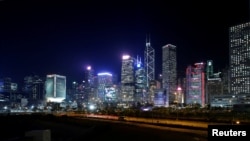China Thursday concluded its week-long, annual political gatherings known as two sessions, with the top legislature approving a national security law on Hong Kong — a measure that could allow Beijing to tighten its grip on the semi-autonomous territory.
The action bypasses Hong Kong’s legislature and ignores widespread opposition inside and outside the territory. The move will likely signal a new U.S.-China clash, although it remains to be seen if Washington and Beijing will turn their verbal confrontation over the former British colony into tit-for-tat retaliation, analysts say.
If the law is enacted later this year, as anticipated, the city’s status as an Asian financial hub will also be undermined, they add.
Another US-China Cold War?
“From the viewpoint of geopolitics, the first battle for a new U.S.-China Cold War has been staged,” said Wu Ruei-ren, an associate research fellow with Academia Sinica in Taipei.
“Sanctions to be imposed by the U.S. will risk Hong Kong’s status as a financial hub and China will eventually pay a dear price. Unfortunately, the city where the battlefield is located will be scorched,” Wu added.
With six members abstaining, China’s parliament, the National People’s Congress (NPC), voted 2,878 to 1 Thursday in favor of the proposal. It empowers its 175-member long-standing committee to formulate national security measures to be directly enacted in Hong Kong.
The measures will likely allow mainland security agents to be positioned in Hong Kong to root out behavior and activities that constitute what Beijing defines as subversion, secession, terrorism and foreign interference.
One country, one system?
The action is widely seen as Beijing’s abandonment of its one country, two systems framework in Hong Kong and a blatant violation of the city’s mini-constitution or Basic Law, while breaking its promise of awarding the city a high degree of autonomy before the year 2047 — accusations that Chinese Premier Li Keqiang denied at the close of the two sessions.
“The decision adopted at the NPC session is designed for steady implementation of ‘one country, two systems’ and Hong Kong’s long-term prosperity and stability,” Li told an international media briefing Thursday afternoon, without elaborating.
Wu of Academia Sinica, however, described the legislation as “laced with desperation” as Beijing apparently sought to distract its people from the mounting political and economic pressures it faces both domestically and internationally.
China’s calculated brinkmanship
Wu also called China’s latest policy toward Hong Kong a strategy of “calculated brinkmanship.” He says China is playing the game of chicken and betting that any retaliatory action from the international community would amount to empty words because the world is busy tackling the COVID-19 pandemic and remains highly dependent on the Chinese economy.
But Wu believes China will end up “intimidating” the U.S. and many Western democracies if Beijing insists on pushing through the legislation. He said it was drastic action to, in his words, ruthlessly crack down on anti-government protesters and democracy fighters in Hong Kong.
One day before the NPC vote, U.S. Secretary of State Mike Pompeo reported to the U.S. Congress and concluded that the city is “no longer autonomous from China,” which suggests Washington may be considering suspending its preferential trade treatment toward Hong Kong.
Media reports said the U.S. is also considering other sanctions. They include an asset freeze and visa restrictions on officials from China and Hong Kong, who are behind the new security policy, as well as bans of high-tech exports to Hong Kong.
A dilemma
The U.S., however, faces a dilemma because most of its financial sanctioning options could hurt the people of Hong Kong, instead of the Communist leadership, which is driving the policy Washington wants to reverse. That is according to Drew Thompson, a visiting senior research fellow at the Lee Kuan Yew School of Public Policy at the National University of Singapore.
Pending the law’s actual content and its impact, it’s too early to tell how the dispute between Washington and Beijing over Hong Kong will play out, although their rhetoric doesn’t help improve their relationship, he said.
And the legislation signals Beijing’s determination to choose between the lesser evil when the city presents a risk to challenge its authority, that outweighs the benefits the city brings to the Chinese economy, Thompson added.
“The popular demonstrations that we are seeing in Hong Kong are a real blow to Beijing in its credibility and that’s what I think concerns them. The impacts of Beijing’s action are not calculated to shape its foreign relations. This is purely a domestic move on their part,” Thompson told VOA.
Financial chaos
Nevertheless, the anticipated confrontation between Washington and Beijing over Hong Kong could sound a death knell to the city’s status as an international financial hub, said Law Ka Chung, former chief economist at the Bank of Communications in Hong Kong.
Law said that potential U.S. asset freezes on Chinese officials will be effective, but China will likely retaliate by freezing assets of Hong Kong-based American companies and placing restrictions on their currency-dominated financial activities.
That will create chaos and collapse the city’s function as a financial hub, while the city’s recent unrest already triggered a capital exodus in the past year, he added.
“For the past year, many who were bearish about the situation in Hong Kong have opened offshore accounts. Right now, some continue to liquidate their Chinese Yuan-financial activities. The demand for offshore accounts is on the rise,” Law told VOA on Wednesday.




